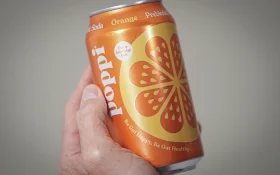Poppi, a well-known soda brand, is currently facing a class-action lawsuit brought by Kristin Cobbs, a consumer who alleges that the company’s products do not provide the gut health benefits that their marketing suggests.
The lawsuit, filed last week in the U.S. District Court in San Francisco, claims that Poppi’s labeling and advertising are misleading to consumers.
Cobbs stated that she purchased Poppi drinks on multiple occasions due to the information on their labels, which describe the products as prebiotic sodas and feature the slogan, “Be Gut Happy. Be Gut Healthy.” However, after conducting further research, Cobbs discovered that Poppi drinks contain only around 2 grams of prebiotic agave inulin fiber per serving. She argues that this amount is insufficient to provide any significant prebiotic benefits to consumers.
To support her claim, Cobbs cited a study that found consuming 7.5 grams of agave inulin daily for three weeks did not result in any meaningful prebiotic effects. The lawsuit also suggests that if consumers were to drink more Poppi in an attempt to increase their prebiotic fiber intake, the potential benefits would be negated by the increased consumption of sugar.
Through this class-action lawsuit, Cobbs is seeking monetary compensation for herself and other consumers who have purchased Poppi products under the impression that they would provide substantial gut health benefits.
In response to the lawsuit, Poppi, which is based in Austin, Texas, issued a statement on Monday defending its products. The company stated, “We are on a mission to revolutionize soda for the next generation of soda drinkers, and we have diligently innovated to provide a tasting experience that millions of people have come to enjoy. We believe the lawsuit is baseless, and we will vigorously defend against these allegations.”
The lawsuit against Poppi highlights the growing trend of functional beverages, which claim to offer various health and wellness benefits to consumers. According to data compiled by consulting firm AlixPartners, sales of prebiotic and probiotic drinks in the United States more than tripled in the previous year, indicating a significant increase in consumer interest and demand for these types of products.
However, the case also underscores the importance of accurate labeling and advertising in the food and beverage industry. Consumers rely on the information provided by manufacturers to make informed decisions about the products they purchase and consume. If the claims made by Poppi about their products’ gut health benefits are found to be exaggerated or unsupported by scientific evidence, it could erode consumer trust in the brand and the functional beverage category as a whole.
As the lawsuit progresses, it will be important to monitor the outcome and its potential implications for the food and beverage industry. The case may set a precedent for how companies market and label their products, particularly those that make health-related claims.
Ultimately, the goal should be to ensure that consumers have access to accurate and reliable information about the products they purchase, allowing them to make informed decisions about their health and well-being.
The Associated Press contributed to this article.
